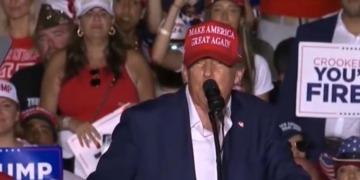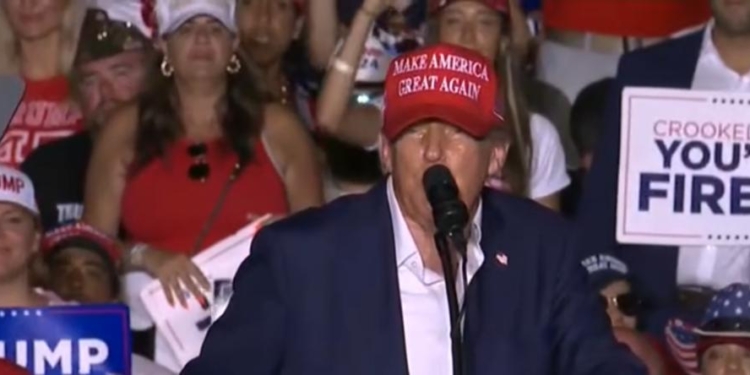Cryptocurrency firms have been responsible for nearly half of all corporate spending so far in the 2024 election, according to a new report released by Public Citizen.
Corporations have spent $248 million to sway federal elections this cycle, with $119.2 million of this sum coming from crypto companies, according to Public Citizen’s analysis of campaign finance records released Wednesday. Expenditures linked to the crypto sector show no clear partisan lean, and the newly politically active industry has received a warm reception from politicians on both sides of the aisle.
Crypto corporations represented just 2.5% of corporate political expenditures in 2022 and 4.6% in 2020, according to Public Citizen’s report.
“No industry has ever before so wholeheartedly embraced raising as much directly from corporations and openly using that political war chest as a looming threat (or reward) to discipline lawmakers toward adopting an industry’s preferred policies,” Public Citizen research director Rick Claypool wrote. “Now the even partisan split in both houses of Congress means the crypto sector’s outsized influence in competitive races has the potential to tip control of Congress one way or the other.”
Fairshake PAC has emerged as the largest player in the crypto industry’s political army, raising $202.9 million mostly from digital currency corporations like Coinbase and Ripple, and spending more than $93 million to date this election cycle, according to Federal Election Commission (FEC) records. Fairshake kicked off the cycle by spending over $10 million to oppose Democratic California Rep. Katie Porter in the state’s open Senate primary.
In March, the PAC pledged to spend money in the Ohio and Montana Senate races, two of the most closely watched elections of the cycle, The New York Times reported.
Since then, Fairshake has promised to spend $12 million to unseat Ohio Democratic Sen. Sherrod Brown, Politico reported. The announcement caused liberal megadonor Ron Conway to abandon the PAC over concerns that the spending would alienate liberal Democratic lawmakers as Congress considers legislation relevant to the industry.
It is still unclear who the PAC will support in Montana, incumbent Democratic Sen. Jon Tester or Republican challenger Tim Sheehy. The PAC has had a bipartisan approach to its House spending, endorsing nine Republicans and nine Democrats, Axios reported.
Republicans appear eager to cash in on the crypto cash flowing into the election, adding a section to their 2024 platform pledging to “end Democrats’ unlawful and un-American Crypto crackdown and oppose the creation of a Central Bank Digital Currency.”
“We will defend the right to mine Bitcoin, and ensure every American has the right to self-custody of their Digital Assets, and transact free from Government Surveillance and Control,” the platform continues. In contrast to the Republican platform, the Democratic Party’s platform is silent on cryptocurrency.
President Joe Biden in March 2022 issued an executive order calling on government agencies to examine the risks and benefits of digital currencies, focusing on consumer protection, financial stability, illicit activity, climate change, inclusion and responsible innovation, according to CNBC. Biden said he wanted to make the crypto industry “more responsible” by reducing its impact on the climate.
Vice President Kamala Harris, however, is seeking a “reset” with the crypto industry ahead of November’s election, reaching out to people close to crypto companies, the Financial Times reported in July. Democratic Senate Majority Leader Chuck Schumer of New York and other Democratic senators attempted to cement this reset at a “Crypto4Harris” town hall fundraiser on Aug. 14 where they expressed support for the industry, according to The American Prospect.
Big players in the crypto industry have grown frustrated with Biden’s Securities and Exchange Commission (SEC) Chair, Gary Gensler, who they view as hostile to digital assets, CNBC reported. Former President Donald Trump has responded to these sentiments by promising to loosen regulations on crypto and to “get out of the way of innovation.”
“We will have regulations, but from now on the rules will be written by people who love your industry, not hate your industry,” Trump said at a July crypto conference in Nashville, The Associated Press reported. The former president promised to make the United States the “crypto capital of the planet” and said he would create a bitcoin “strategic reserve.”
Several deep-pocketed crypto industry donors have shown an openness to Trump, appearing at a high-dollar fundraiser held by the former president in June. Among the attendees were Coinbase Chief Legal Officer Paul Grewal as well as Cameron and Tyler Winklevoss, famous for their dispute with Mark Zuckerberg over the founding of Facebook and now running a cryptocurrency exchange called Gemini, a source familiar with the event previously told the Daily Caller News Foundation.
The value of cryptocurrencies had varied wildly across time, with Bitcoin being worth about $3,300 a coin in January 2019, jumping to almost $61,000 in October 2021 only to drop to about $12,200 per coin in December 2022 and rocketing back up to around $60,000 a piece in August, according to Yahoo Finance.
Stuart Alderoty, chief legal officer of the blockchain giant Ripple, also made an appearance at the fundraiser, taking the opportunity to explain how his firm had to spend over $100 million to ward off litigation brought by the SEC, CNBC reported.
“The crypto sector strategy seems to be: give crypto corporations what they want, or your political career gets it,” Claypool wrote in Public Citizen’s report.
All content created by the Daily Caller News Foundation, an independent and nonpartisan newswire service, is available without charge to any legitimate news publisher that can provide a large audience. All republished articles must include our logo, our reporter’s byline and their DCNF affiliation. For any questions about our guidelines or partnering with us, please contact [email protected].



























 Continue with Google
Continue with Google